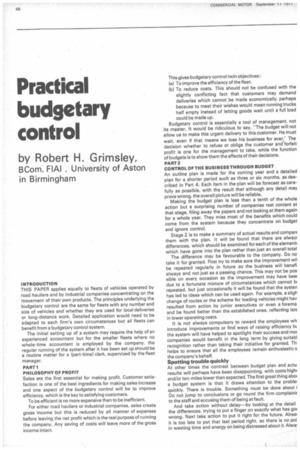Practical budgetary control
Page 74

If you've noticed an error in this article please click here to report it so we can fix it.
by Robert H. Grimsley,
BCom, FIAI , University of Aston in Birmingham
INTRODUCTION THIS PAPER applies equally to fleets of vehicles operated by road hauliers and by industrial companies concentrating on the movement of their own products. The principles underlying the budgetary control are the same for fleets with any number and size of vehicles and whether they are used for local deliveries or long-distance work. Detailed application would need to be adapted to each firm's own circumstances but all fleets can benefit from a budgetary control system.
The initial setting up of a system may require the help of an experienced accountant but for the smaller fleets where no whole-time accountant is employed by the company, the regular running of the system after it has been set up should be a routine matter for a (part-time) clerk, supervized by the fleet manager.
PART 1 PHILOSOPHY OF PROFIT Sales are the first essential for making profit. Customer satisfaction is one of the best ingredients for making sales increase and one aspect of the budgetary control will be to improve efficiency, which is the key to satisfying customers.
To be efficient is no more expensive than to be inefficient.
For either road hauliers or industrial companies, sales create gross income but this is reduced by all manner of expenses before leaving the net profit which is the real purpose of running the company. Any saving of costs will leave more of the gross income intact. (b) To reduce costs. This should not be confused with the slightly conflicting fact that customers may demand deliveries which cannot be made economically, perhaps because to meet their wishes would mean running trucks half empty instead of letting goods wait until a full load could be made up.
Budgetary control is essentially a tool of management, not its master. It would be ridiculous to say, "The budget will not allow us to make this urgent delivery to this customer. He must wait, even if that means we lose his business for ever.' The decision whether to refuse or oblige the customer and forfeit profit is one for the management to take, while the function of budgets is to show them the effects of their decisions. PART 2 CONTROL OF THE BUSINESS THROUGH BUDGET
An outline plan is made for the coming year and a detailed plan for a shorter period such as three or six months, as described in Part 4. Each item in the plan will be forecast as carefully as possible, with the result that although any detail may prove wrong, the overall picture will be reliable.
Making the budget plan is less than a tenth of the whole action but a surprising number of companies rest content at that stage, filing away the papers and not looking at them again for a whole year. They miss most of the benefits which could come from the system because they concentrate on budget and ignore control.
Stage 2 is to make a summary of actual results and compare them with the plan. It will be found that there are always differences, which should be examined for each of the element; which have gone into the plan rather than just an overall total The difference may be favourable to the company. Do no take it for granted. First try to make sure the improvement wil be repeated regularly in future so the business will benefi always and not just as a passing chance. This may not be pos sible on every occasion as the improvement may have beer due to a fortunate mixture of circumstances which cannot bi repeated, but just occasionally it will be found that the systen has led to ideas which can be used again. For example, a sligh change of routes or the scheme for loading vehicles might hay. resulted from action by junior executives or even a forema and be found better than the established ones, reflecting latE in lower operating costs.
It is not always compulsory to reward the employees wh introduce improvements or find ways of raising efficiency bL the system will have helped to spotlight their success and mo; companies would benefit in the long term by giving suitabl recognition rather than taking their initiative for granted. Th helps to ensure that all the employees remain enthusiastic o the company's behalf.
Spotting trouble quickly
At other times the contrast between budget plan and actu. results will perhaps have been disappointing, with costs high( and/or ton-miles lower than expected. The first great thing abot a budget system is that it draws attention to the problei quickly. There is trouble. Something must be done about i Do not jump to conclusions or go round the firm complainir to the staff and accusing them of being at fault.
And take action without delay—by looking at the detail the differences, trying to put a finger on exactly what has gor wrong. Next take action to put it right for the future. Alreat it is too late to put that last period right, so there is no poi in wasting time and energy on being distressed about it. Alvvw




















































































































